Unbreakable, Them All!
They braved COVID-19, the ensuing lockdowns, the threats and the crowds…the deaths of their colleagues, friends even their own immediate relatives. Manu Shrivastava talks to essential service providers in uniform, all survivors in their own right, on their life experiences, personal losses and…ultimate victories!
While all of Colaba stayed indoors, stepping into their balconies and at their windows only to clang thalis, it were the uniformed warriors who stayed out, risking their very lives to keep the public safe. During the COVID-19 pandemic period that included the national lockdown beginning 25 March 2020 and several other lockdowns that followed to tackle the first, second and third waves of COVID-19, Colaba’s uniformed warriors spilled out on the streets and worked fearlessly, even in high-risk crowded areas, in containment zones providing a host of services and ensuring the safety and security of citizens - without which the city’s oldest precinct would have crumbled. Today, as Colaba registers its usual bustle, it’s time to look back who made it possible.
 |
| ON GUARD: Colaba’s uniformed warriors spilled out on the streets and worked fearlessly |
After battling the harshest of circumstances, the infection itself, in some cases, these frontline workers continued to work, day and night, risking their own health and that of their families. In Mumbai, BMC personnel from various departments continued to execute their duties - handling high-risk COVID wards, sweeping the streets, moving door-to-door to identify patients and quarantine those positive, etc.; police personnel guarded containment zones and manned nakabandis during lockdown; fire personnel continued to work performing large scale sanitisation and rescue operations; BEST staff plied buses even provided electric supply services in containment zones and MTNL personnel who continued to work behind the scenes to ensure all stayed well.
Fighting Fires And At Home…Winning too!
For Colaba Fire Station's Senior Station Officer Shankar Pol taking a break in fear of contracting the virus wasn’t even an option. During the pandemic, fire personnel were pressed in duty to provide manpower and fire equipment for large-scale sanitisation and rescue operations. A total of four officers and 42 staff members strong force were available for support round the clock.
With his family living within the fire-station premises, the risks for his diabetic and hypertensive mother Babutai Pol and his two daughters seven-year-old Prisha and three-year-old Dnyanada were high. "I was worried for my family as my children were very young, my mother had severe comorbidities and, at one point, the cases in the zone had escalated to a peak. The fire calls and rescue calls didn't stop and I would frequently visit infected zones for surveys, etc. Duty comes first and I did what had to be done. Fortunately, no one in my staff contracted the virus even as many of them had to live at the premises, when on duty, during the pandemic," recalls Mr Pol.
Apart from the staff, his wife Sandhya Pol who works as a nurse in Cama Hospital, and during the pandemic got posted in the high-risk COVID ward on several occasions, procured COVID, not once but twice. "It was an extremely trying period for me and my family. With my husband also working during the crisis, I had no one to take care of my children and mother-in-law," she says.
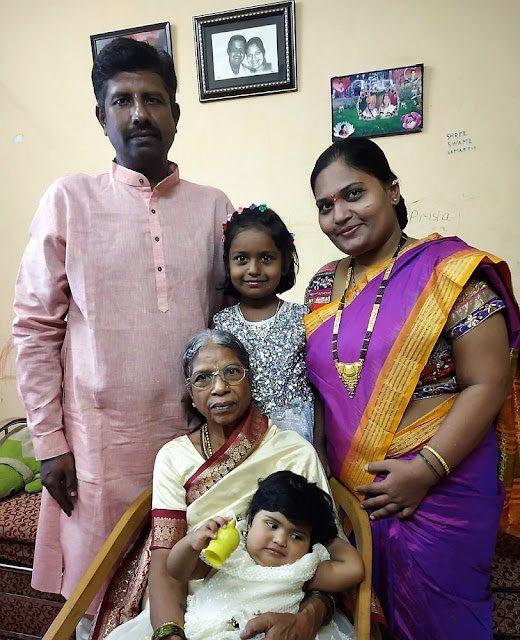 |
| FAMILY TIME: Shankar Pol with mother, wife Sandhya and daughters Prisha and Dnyanada |
"The worst part of this was, I could not even let my daughters come close to me. In time, even they got used to it and stopped coming close to me or touching my things around the house. In fact, during the first wave, I would stay in my room the whole time when at home. I would only see my daughters from a distance even as the younger one was still breastfeeding and that was very difficult," says Sandhya recalling the time with moist eyes.
The first time Sandhya got infected was in May 2020 when she got admitted for two weeks in Cama Hospital. "After that I decided to leave my two daughters with my parents at my village in Satara. On the very next day of dropping them at the village, my father got a stroke and passed away soon after. I had to bring my girls back to Mumbai. The worst part of the entire situation was that though I wanted to take care of my family, I couldn't risk going near them."
Despite all the difficulties, she continued her work rotating between COVID and other wards even getting infected the second time. Shankar Pol says, "For my family, it was an extremely difficult phase as a family as both of us were working in high-risk zones and Sandhya even lost her father during the period. I am glad we were able to discharge our duties well. I am sure my daughters will be proud of us when they are older enough to understand things."
At Risk Yet Kept The Zone Disinfected
Colaba has many slums of which several pockets were declared containment zones at different points in time. BMC A Ward Pest Control Department's labour Khandu Ghuge worked non-stop during the pandemic even as his colleagues and some seniors got infected. In the worst phase of COVID when no one wanted to leave the safety of one's home, Ghuge stepped out as if nothing had changed, wearing a PPE kit, gloves and face mask, sanitising containment zones and sealed buildings. "I was working in zones where no one wanted to go even close, not even the relatives of family members of the residents."
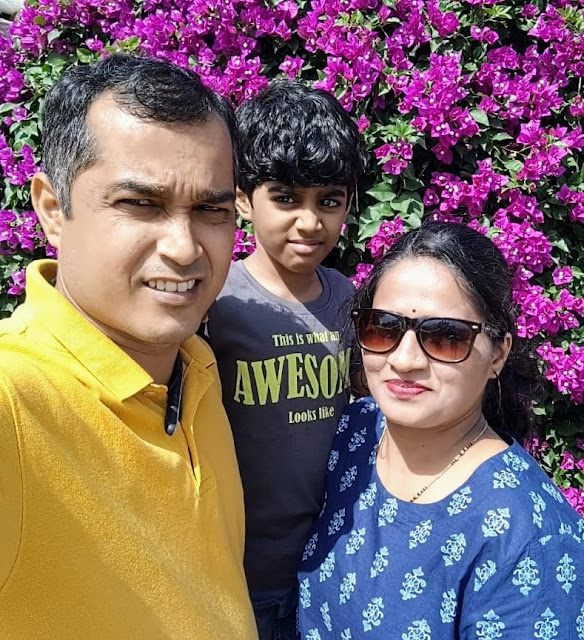 |
| ALL SAFE: Khandu Ghuge with wife Komal and son Aryan |
When asked if he wasn't scared that he may get infected himself or put the family that includes his seven-year-old son Aryan, at risk he says, "I live in a joint family and almost everyone in my family was at the frontline during the COVID period...my wife Komal is a nurse in a BMC facility and my brother-in-law in a policeman. They all worked during the pandemic. My son also understood that we had to step out and was very understanding," says a resolute Ghuge.
Suffered, Lost Family Members Yet Bounced Back
Police Havaldar Laxman Kulkarni of Colaba Police Station had to face the brunt of COVID-19 in ways one couldn’t even imagine. Not only did he contract the virus and develop complications during the treatment, his wife and elder daughter got infected too. During this period, he lost four members of his family to the deadly infection.
In September 2020, while posted at V P Road Police Station, Kulkarni developed a cold, body pain and fever. When medicines didn't provide any relief, he got himself tested for COVID-19 and tested positive. Soon enough, PPE kit-clad BMC personnel landed at his room in Colaba Police Line, at Electric House. The first thing they did was to shift his wife Priya and daughters Joshana and Madhavi to a hotel. "They could not stay in the house as we share the toilet/bathroom with another family. And, at the time, beds were in extreme shortage so it took a while before I could get a bed for myself. My senior at the police station and the DCP at the time were very helpful and arranged one for me soon."
 |
| TOGETHER AGAIN: Laxman Kulkarni with wife Priya and daughters Joshana and Madhavi |
During the treatment, he developed several complications because of the heavy steroids he took during treatment. The nine-day stay got worse when he developed trouble breathing, his hands would swell up badly and had to be given 54 bottles of saline and blood sugar skyrocketed to above 400. “I was given insulin injections 2-3 times days and blood thinners as well. I also gained a lot of weight because of the steroids."
On the sixth day of their stay, his wife and elder daughter tested positive too. "They were then sent to the COVID centre near J J Hospital and kept there for two weeks. I was also in the hospital and couldn't do anything. My brother-in-law finally came from Belapur to take my younger daughter who then stayed with my sister while we all were away and separated. It was the worst time for my family"
Despite all the difficulties and four deaths in his family, Kulkarni's zest for work did not diminish. He says, "So many police personnel got the infection and many succumbed to it...I even lost a few colleagues. But, as soon as the prescribed resting period ended, I resumed my 12-hour daily duty that I perform till date, without fail."
This Cop Fed Birds, Rested And Returned
For Cuffe Parade Police Station's Police Sub Inspector 57-year-old Chandrakant Bhalerao, the pandemic began with a 'nature call'. Few would be aware of the presence of Bhalerao, posted at Nariman Point at the time or even aware the enormity of his work during the first yet the most dreadful weeks of the nationwide lockdown.
When Mumbai, like the rest of India, wore a deserted look with empty roads and a deafening silence, it was Bhalerao who, sitting alone at the fag end of Marine Drive, ensured pigeons, used to the flurry of tourists for food, didn’t stay hungry. Posted with the Marine Drive Police Station at the time, Bhalerao became a familiar figure for the avians.
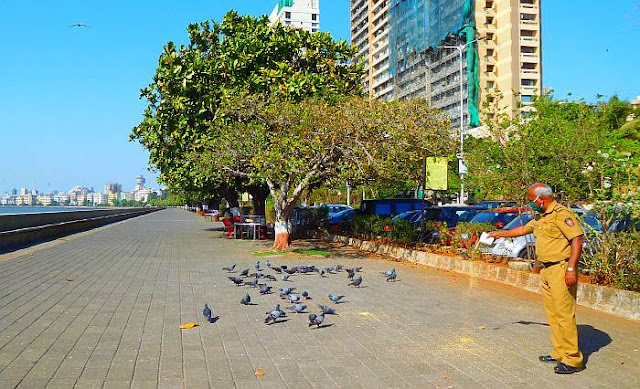 |
| FEATHERED FRIEND: Chandrakant Bhalerao feeding birds at Nariman Point |
"With the lockdown in place, tourists and walkers had stopped coming to Nariman Point. A handful of them would come every few days to give sacks of grain and the swarm of pigeons would come down at regular intervals for their meals," he says. With the absence of humans across the zone at the time, the birds were lucky to have Chandrakant as their savior. Few policemen would go beyond their line of duty to 'feed the birds' as a rule, in the times of COVID-19.
After the five-month mandatory 'rest' given to him during the pandemic, owing to his age, Bhalerao resumed work as if he had never left. As one of the senior-most personnel at the police station, his diligence and sense of duty inspires the younger members.
Caught COVID Tackling Traffic, Fought...Returned
During the pandemic, one of the biggest challenges was keeping the movement of people in check. The traffic police personnel across Mumbai's densely-populated zones made sure there unnecessary movement of vehicles was checked and those of essential service providers moved unhindered. Police Inspector Mubarak Shaikh, recently transferred to Tardeo Traffic Division, was handling the Colaba Traffic Division during the peak of the pandemic.
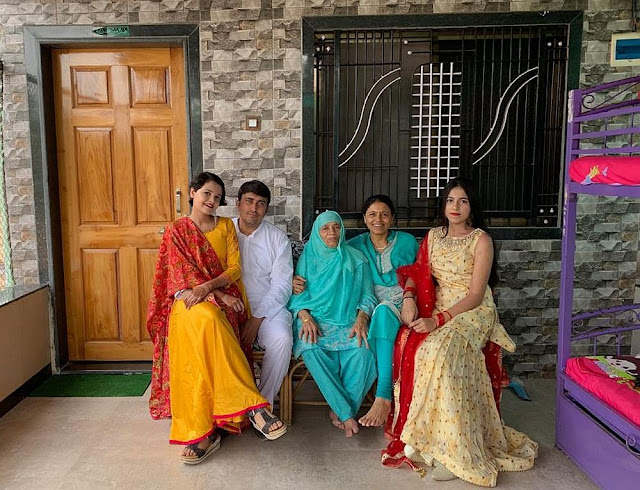 |
| GOOD TO GO AGAIN: Mubarak Shaikh with family |
Mother of two daughters, Ms Shaikh contracted the infection in November 2020 in the process of disseminating her duties. "My driver was not keeping well so I suggested he took leave. The very next day, I developed symptoms including fever and body-ache. I got myself tested for COVID-19 and I tested positive. Thankfully I was able to avail home quarantine and rested at home," she maintains.
"Of the 110 personnel in Colaba Traffic Division, ten got infected. Everyone resumed work as soon as possible. I was quarantined for 11 days and joined soon after working at least 12 hours every day." Traffic police personnel toiled day and night to keep the necessary checks in place even travelling from the far suburbs of the city battling all odds.
Contracted COVID, Yet Kept Family Safe
 |
| Pravin Bhangare |
"My colleagues and I would work around the clock manning containment zones. I was posted in one of the slums and had to ensure no one left the zone. When I tested positive in May 2020, I got admitted in a COVID facility for seven days. My oxygen levels fell down to 89-90 and was given oxygen support. However, after discharge, I joined work on the eight day," he offers.
Owing to the nature of his work, Bhangare would be worried sick for his two daughters five-year-old Vedika and ten-year-old Tanvi and wife Poonam. "From the onset of the pandemic, I made sure my daughters took necessary supplements and tonics so their immunity stayed strong." Despite the risks, Bhangare like most of his colleagues continued to serve in the harshest of circumstances. Till date!
Keeping The Phone Lines Open Despite Risk
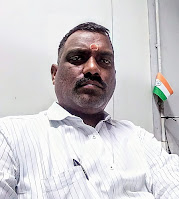 |
| Jeetbahadur Yadav |
A resident of Sion's Antop Hill where he lives with four daughters, son, wife and 72-year-old mother who encouraged him to go to work despite the obvious reluctance. "I was petrified that I would contract COVID-19 and pass it on to my wife or mother who would suffer for no fault of theirs," says Yadav recollecting the days when he would remove his work clothes on a chair in the living room itself and step straight into a bath before meeting any family member.
Yadav worked for years at Colaba Telephone Exchange before moving onto the headquarter at Prabhadevi in Mumbai. His exemplifies the work undertaken by thousands of MTNL employees, silently without accolades. They've all been Corona warriors whose work remained Unsung yet priceless.
Cleaned Streets Yet Kept Family Even New-Born Safe
During the worst phase of the pandemic, the streets and by lanes of Colaba would be deserted like never before. The eerie morning silence would be broken with the sounds of the Brihanmumbai Municipal Corporation (BMC) workers who could be spotted from afar across the zone cleaning the streets and collecting garbage.
Employed with the BMC since 2007, sweeper Gajendra Chandorkar, who lives with wife Neelam, six-year-old son Sarthak and six-month-old daughter Aarvi, has been diligently working during his shift from 6.30 am till 1.30 pm now for months on end including during the lockdown.
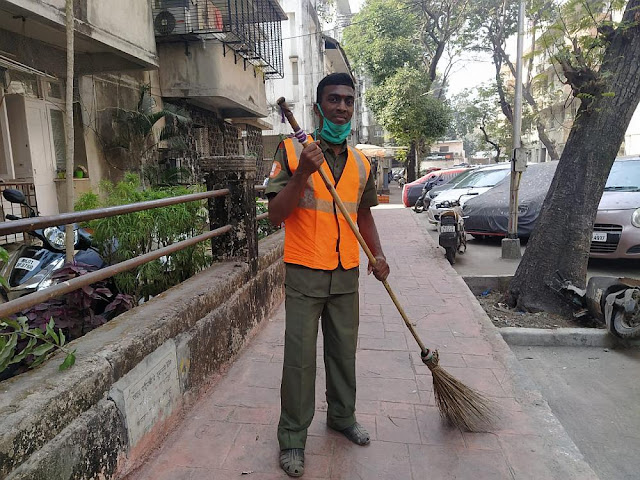 |
| DUTIFUL: Gajendra Chandorkar at work |
"I recall everyone being scared throughout the lockdown. Why, even I would be petrified to meet people too," he says. "People would be scared to come close to sweepers or even talk to BMC workers, directly dealing with waste and garbage, for fear of contracting Coronavirus," maintains Gajendra.
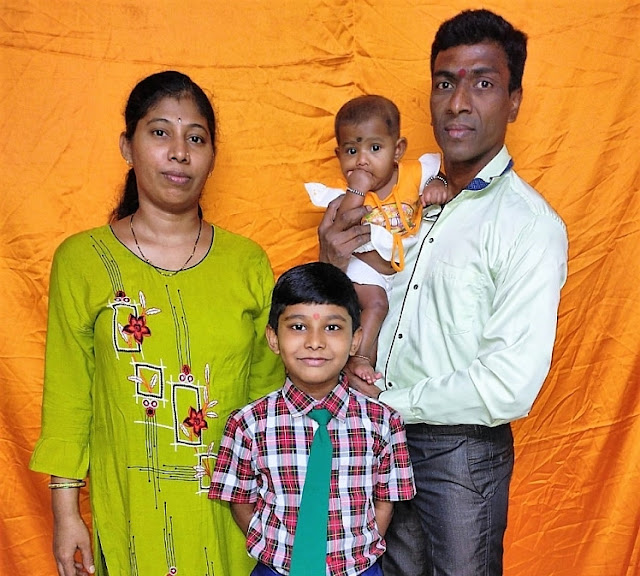 |
| THROUGH THICK AND THIN: Gajendra with wife Neelam, son Sarthak and new-born Aarvi |
Gajendra's daughter Aarvi was born during the pandemic in September 2021. "I was very worried at the time especially because my wife developed gestational diabetes during her pregnancy. My home being small made it difficult to keep distance from other members but we managed…somehow," he says. Despite having a new-born at home, he continued to clean the streets of Colaba so residents could live and walk in a clean environment.
During the unprecedented pandemic that gripped the entire nation many rose to the occasion. In Mumbai, the police personnel were heavily affected and many even lost their lives. Colaba Police Station Senior Inspector Vijay Hatiskar who took charge in January 2022 and worked with the Worli Traffic Division earlier.
"When I joined here in Colaba I realised how the 197 officers and staff relentless performed their duties during the COVID crisis. A few contracted the infection but resumed work as soon as they got better. This is the spirit that inspires others to continue in such times," sums up Mr Hatiskar.
(Note: Some subjects may have removed their masks only to be identified in photographs to be used with this news report. COVID-19 appropriate behaviour has been maintained at all times)
When all of Colaba stayed indoors during the lockdown and three waves, Colaba’s uniformed warriors spilled out on the streets and worked fearlessly to keep all safe. The Draft Colaba pays tribute to those who made it possible.#FirePersonnel #Police #BMC https://t.co/V1xOHrkvF9
— The Draft Colaba News (@TheDraftColaba) March 21, 2022
Follow The Draft Colaba: Facebook | Twitter | Instagram | YouTube




Post Comment